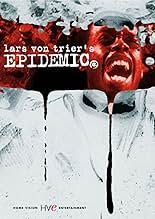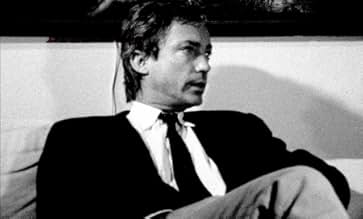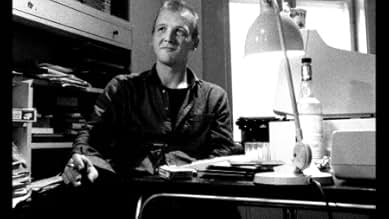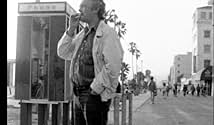VALUTAZIONE IMDb
5,9/10
6486
LA TUA VALUTAZIONE
Un regista e uno sceneggiatore scrivono una sceneggiatura e, nel processo, confondono il confine tra finzione e realtà.Un regista e uno sceneggiatore scrivono una sceneggiatura e, nel processo, confondono il confine tra finzione e realtà.Un regista e uno sceneggiatore scrivono una sceneggiatura e, nel processo, confondono il confine tra finzione e realtà.
- Premi
- 1 candidatura in totale
Recensioni in evidenza
Epidemic appears to be all stylistic self-indulgence. It is filmed in black and white, with often purposely redundant subtitles. Each shot is very very long. Some are stoic, some are suddenly goofy, some are disturbing, mostly stoic. When there is dialogue, it is intellectually stimulating, but borderline irrelevant.
Mainly, it is that director Lars Von Trier and his screenplay collaborator Niels Vorsel play themselves, coming up with a last-minute script for a producer. This strand takes disproportionate turns with scenes from their script, in which Von Trier plays a radical doctor attempting to cure a modern-day epidemic. In an warped turn, the doctor finds that he himself has been spreading it. For so long, one is left without a clue as to why there is such a coincidence between the screenplay and the outside world, or any progressions of the different narrative strands' signifying signs. But it infects you. It burns you.
Whether or not the film is narcissistic, it is not form over function. Essentially, it is a basic exercise in what metaphysically affects the viewer. Consider the scene of the darker, quieter of the screenwriters in the subway, knowing predeterminately that the other one is going to die. Or when he looks in a mirror, turns to us, the camera, then the mirror again. Everything one expects would create a cohesive, sense-making narrative film is inverted and indeed develops an immediately conscious connection between itself and the audience.
That is not to say it eschews any fundamental aspect of quality. Udo Kier delivers one of the most amazing, fantastic performances I have ever seen. Really, many of the performances, whoever these actors, or characters, are, shock and deeply move us. Some scenes are entirely made up of uproarious laughter or breakdowns of screaming, in spite of the unapologetic stoicism and quiet permeating the film.
This hypnotic abstraction is truly very atmospheric and creepy. It is a transcendental, almost physiologically affecting virus that infests you for days upon being subjected to it. It is something that has to be seen and can hardly be explained. And that makes it a true work of art.
Mainly, it is that director Lars Von Trier and his screenplay collaborator Niels Vorsel play themselves, coming up with a last-minute script for a producer. This strand takes disproportionate turns with scenes from their script, in which Von Trier plays a radical doctor attempting to cure a modern-day epidemic. In an warped turn, the doctor finds that he himself has been spreading it. For so long, one is left without a clue as to why there is such a coincidence between the screenplay and the outside world, or any progressions of the different narrative strands' signifying signs. But it infects you. It burns you.
Whether or not the film is narcissistic, it is not form over function. Essentially, it is a basic exercise in what metaphysically affects the viewer. Consider the scene of the darker, quieter of the screenwriters in the subway, knowing predeterminately that the other one is going to die. Or when he looks in a mirror, turns to us, the camera, then the mirror again. Everything one expects would create a cohesive, sense-making narrative film is inverted and indeed develops an immediately conscious connection between itself and the audience.
That is not to say it eschews any fundamental aspect of quality. Udo Kier delivers one of the most amazing, fantastic performances I have ever seen. Really, many of the performances, whoever these actors, or characters, are, shock and deeply move us. Some scenes are entirely made up of uproarious laughter or breakdowns of screaming, in spite of the unapologetic stoicism and quiet permeating the film.
This hypnotic abstraction is truly very atmospheric and creepy. It is a transcendental, almost physiologically affecting virus that infests you for days upon being subjected to it. It is something that has to be seen and can hardly be explained. And that makes it a true work of art.
10ooeht
Of course, you gotta be a masochist to enjoy some people's genius - you know that if you bear with them they will take you to new levels of perception.
With Lars von Trier, the voyage is often hilarious. Epidemic is funny. Funny, in a Gummo kind of way: the characters are real, reality is eerie, and we laugh to break the tension; funny in a the characters say amusing things kind of way (preacher: "this bible is in goddamned Latin"); and funny in an Andy Kaufman screwing with the audience (yes, you) kind of way.
Make no mistake: you will suffer. If you are afraid, stay away from horror movies, ya pansy!
This movie also features some great aesthetic distance! It's bold!
With Lars von Trier, the voyage is often hilarious. Epidemic is funny. Funny, in a Gummo kind of way: the characters are real, reality is eerie, and we laugh to break the tension; funny in a the characters say amusing things kind of way (preacher: "this bible is in goddamned Latin"); and funny in an Andy Kaufman screwing with the audience (yes, you) kind of way.
Make no mistake: you will suffer. If you are afraid, stay away from horror movies, ya pansy!
This movie also features some great aesthetic distance! It's bold!
EPIDEMIC (Lars von Trier - Demark 1987).
Von Trier's second feature reveals his obsessions with cinema, with his self-imposed limitations on film-making in many ways foreshadowing Von Trier's later obstructions upon Jorgen Leth in THE FIVE OBSTRUCTIONS (2003).
Essentially a film about his own obsessions, or a grand parody on horror, as some suggested. Von, Trier, frustrated by the delay of his never realized project, "The Grand Mal", about two gangster families in divided Berlin, made a bet with film consultant Claes Kastholm of the Danish Film Institute, claiming that he could make a feature film for one million Danish kroner. Resulting partly in an amateur movie about a film director and a scriptwriter who must write a new manuscript in five days, interspersed with scenes from the film they are working on - about a young idealistic doctor in the late 20th century, who tries to fight an epidemic, but only manages to spread it further. The film culminates with the outbreak of a deadly plague, not in the past but in the present. Throughout the film, Von Trier shows his fascination with Germany, for example, during a ride through the "Ruhrgebiet", the industrial core of Europe, or the world, at least during the '80s.
Camera Obscura --- 8/10
Von Trier's second feature reveals his obsessions with cinema, with his self-imposed limitations on film-making in many ways foreshadowing Von Trier's later obstructions upon Jorgen Leth in THE FIVE OBSTRUCTIONS (2003).
Essentially a film about his own obsessions, or a grand parody on horror, as some suggested. Von, Trier, frustrated by the delay of his never realized project, "The Grand Mal", about two gangster families in divided Berlin, made a bet with film consultant Claes Kastholm of the Danish Film Institute, claiming that he could make a feature film for one million Danish kroner. Resulting partly in an amateur movie about a film director and a scriptwriter who must write a new manuscript in five days, interspersed with scenes from the film they are working on - about a young idealistic doctor in the late 20th century, who tries to fight an epidemic, but only manages to spread it further. The film culminates with the outbreak of a deadly plague, not in the past but in the present. Throughout the film, Von Trier shows his fascination with Germany, for example, during a ride through the "Ruhrgebiet", the industrial core of Europe, or the world, at least during the '80s.
Camera Obscura --- 8/10
Look, I know a substantial proportion of the American population get a little hot under the collar when funny-talking foreigners start criticising the American government and way of life, but hey - when you're the only country in the world inclined to and capable of dictation of world policy, you gotta take it on the chin. While Von Trier even makes me wince sometimes (the end credits to Dogville for instance), it's his point of view and is worthy of thought. He isn't here to lick your derrière clean for you - if you can't take a little criticism of the homeland, I'd steer clear of any imported movies for a while. Anyhoo, when truly disrespectful films like Titanic break records and reap awards with nary a raised eyebrow, it's double standards to expect non-US films to walk the line you'd like. Von Trier is a genius film-maker... you may not agree with his politics, but you cannot doubt his talent.
I obviously was in the right mood, since I don't give it a horrible mark. I do give it a 6 out of 10, because it is obviously such a low budget movie and it's definitely very original, but other than that, I am still amazed I watched it till the end.
Two screenwriters are trying to do in 5 days what they barely succeeded in one and a half years, that is write a script. They lost their original screenplay, which by now they can barely remember how it started, due to a bad disk. Each day is accompanied with scenes of their creative process, scenes from the movie they would do and dialogues with different people.
Now it happens that I've just written an IMDb comment that said "Funny little things: Udo Kier plays a short role in this movie, and he is really young". Deja vu! Udo Kier plays in this one, as well.
The movie is shot in black and white, probably by the same single camera, and the sound is almost not processed giving the whole movie a documentary like feeling. There are a lot of things written between the lines, the satire of the government and film industry being the most obvious.
Conclusion: you should watch this mostly if you're Danish. Else if you are a movie critic or deep into films. It is NOT a horror movie. A movie that has some gore at the very end is not horror. And also you have to have the right set of mind to watch it.
Two screenwriters are trying to do in 5 days what they barely succeeded in one and a half years, that is write a script. They lost their original screenplay, which by now they can barely remember how it started, due to a bad disk. Each day is accompanied with scenes of their creative process, scenes from the movie they would do and dialogues with different people.
Now it happens that I've just written an IMDb comment that said "Funny little things: Udo Kier plays a short role in this movie, and he is really young". Deja vu! Udo Kier plays in this one, as well.
The movie is shot in black and white, probably by the same single camera, and the sound is almost not processed giving the whole movie a documentary like feeling. There are a lot of things written between the lines, the satire of the government and film industry being the most obvious.
Conclusion: you should watch this mostly if you're Danish. Else if you are a movie critic or deep into films. It is NOT a horror movie. A movie that has some gore at the very end is not horror. And also you have to have the right set of mind to watch it.
Lo sapevi?
- Curiosità sui creditiThe film's title appears in red letters in the upper left corner of the screen for the entire length of the film.
- ConnessioniFeatured in The Making of 'Europa' (1991)
- Colonne sonoreTannhäuser (The Overture)
Composed by Richard Wagner
I più visti
Accedi per valutare e creare un elenco di titoli salvati per ottenere consigli personalizzati
- How long is Epidemic?Powered by Alexa
Dettagli
Botteghino
- Lordo in tutto il mondo
- 938 USD
- Tempo di esecuzione
- 1h 46min(106 min)
- Colore
- Mix di suoni
- Proporzioni
- 1.66 : 1
Contribuisci a questa pagina
Suggerisci una modifica o aggiungi i contenuti mancanti



















